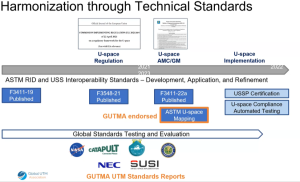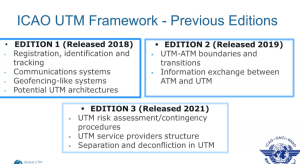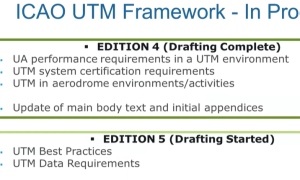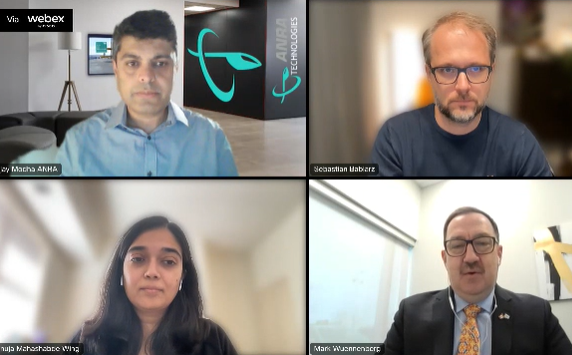By Jenny Beechener
Harmonising global standards for Uncrewed Traffic Management (UTM) requires broader participation, in particular from industry, speakers agreed on day two of the GUTMA Harmonized Skies UTM US event on December 13 and 14, 2022. Anuja Mahashabde, Wing Product Manager, said publication of Europe’s UTM Acceptable Means of Compliance and Guidance material (AMCGM) in the coming weeks will inform standards efforts elsewhere, but “we need to broaden the aperture” through wider participation in standards development. This is also relevant to “non-technical challenges with implementing standards and service provision,” where “there is a need for a collaboration framework agreement and governance for industry to come together and share data with each other to implement standards like interoperability.” Industry needs to exchange data amongst themselves while at the same time maintaining quality of service, security, privacy and safety.
“We are coming with standards at light speed compared to traditional aviation,” said Sebastian Barbiarz, DroneUp Head of Airspace Innovation (see slide below). “We are implementing and testing really fast, which gives the perspective we can deliver value faster than manned aviation in past. But to achieve this, we need the industry’s technical input.” For example, competitors are working together to create common standards within the Eurocae geodata exchange working group, where “we need these contributors”. Speaking on Day One, DroneUp CEO and Founder John Vernon said the industry needs to “tear down competition walls” and progress beyond “one-off” applications, adding “we have to do more to learn more.”

ASTM is looking more closely at “prioritisation and how to address situations where conflicts may be allowed, between operational intents, or situations where conflicts are not allowed. Other focus topics include fairness, access to airspace, and negotiating between operational intents,” said Anuja Mahashabde. It is also using feedback from the Federal Aviation Administration (FAA) UTM Field Trials underway at test sites such as the New York UAS Test Site and Virginia Tech Mid-Atlantic Partnership.
The ICAO Drone Enable symposia platform is part of this process, and plays an important role in showing how certification in one region can apply to another. UAS Advisory Group chair, Mark Wuennenberg, said ICAO has completed Edition 4 of its UTM Framework in draft form, and started on Edition 5 based following Drone Enable 2022 which concluded two weeks’ ago. ICAO will issue a Request for Information (RFI) in mid-January 2023, followed by selection of proposals in June ahead of presentations at Drone Enable 2023 scheduled to take place at the end of September in Brazil. “We will keep reporting best practices and lessons learned in a summary document and continue to provide good guidance material that will turn into standards.”






